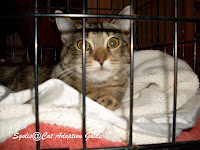When it
comes time to adopt a new cat you will want to choose a healthy cat that has a
friendly behavior towards humans.
Make a point to spend time with the cat before you adopt them to look carefully at the cat and to examine them for specific health concerns.
Make a point to spend time with the cat before you adopt them to look carefully at the cat and to examine them for specific health concerns.
Choose
a cat that is outgoing and friendly with people. A cat that comes to you and rubs on you is a
people friendly cat. A cat that runs and hides or hisses at you is afraid of
you.
Newly socialized feral kittens will hide from you or they will hiss at you. Even though feral kittens have been socialized they need time to acclimate to their new surroundings and may hiss or hide out of fear of you and their new surroundings.
Newly socialized feral kittens will hide from you or they will hiss at you. Even though feral kittens have been socialized they need time to acclimate to their new surroundings and may hiss or hide out of fear of you and their new surroundings.
Check the cats
general health do this by looking at the cat’s ears to make sure there is no black
discharge or staining on the inside of the ears. The staining on the ear is a sign that the
cat has ear- mites. If you are adopting
an outdoor cat or a feral kitten then this is normal considering that they live
outdoors.
Open up
the cat’s mouth if you are able to do so to check their teeth and gums. Look for pink gums with no evidence of ulcers
or loose teeth.
Look at
the cats eyes; make sure that they are clear with not tear stains. Then look at the cat’s nostrils to make sure
they are clean with no nasal drainage.
If the cat has a runny nose or is tearing then this is a sign that the
cat may have feline herpes or an upper respiratory infection.
A healthy cat will have
a shiny coat with no thinning of the hair or bald spots. If you note that the cat has dry flaky skin
that looks like dandruff then this is a sign that the cat has external
parasites, or a thyroid condition. If you are adopting a
feral kitten or an abandoned cat that lived outdoors then external and internal
parasites are expected. This condition can be remedied by taking the cat to veterinarians
for parasite treatment for cat and kittens.
If possible check the cat’s feces to make sure that stool are
well-formed and that there are no white specks. White specks are a sign of tapeworms.
Adopt a
kitten when it is 8 weeks old and has been weaned from its mother, not taken
away from its mother and forced to eat solid food at a younger age. Kittens need their mother’s mild to build a strong
immunity. When the kitten is weaned from the mother cat it is ready to be
adopted.
Interview the
adopter to find out about the health of the cat, booster vaccinations, ask to
see the veterinarians wellness check-up, inquire about the cat food and if the
cat was treated for tapeworms or other parasites.
Before adopting an adult cat ask if the cat
was tested for Feline Leukemia, Feline immunodeficiency virus, and Feline
herpes. Find out if vaccines are current
and if the cat has been spayed or neutered.
Ask to see the veterinarian’s wellness exam on the cat and inquire about
the type of food the cat eats as well as internal and external parasite
treatments.
Tips:
I use revolution topical treatment for every cat
that comes through our shelter doors. Revolution
kills adult fleas and flea eggs and ear mites. It also prevents heartworms,
hookworms and roundworm parasites in cats. .
Get your home ready for a new cat by treating your home with diatomaceous earth food grade to kill fleas, ticks,
lice, mites and other home pests safely without being harmful to your family or
other pets. Treat your home before you bring home your new cat.

No comments:
Post a Comment